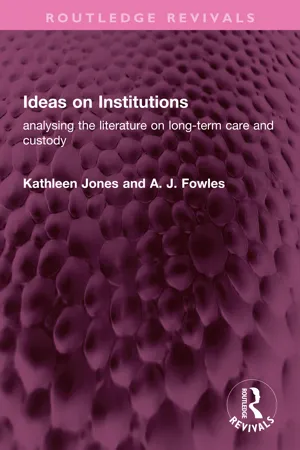
Ideas on Institutions
analysing the literature on long-term care and custody
- 240 pages
- English
- ePUB (mobile friendly)
- Available on iOS & Android
Ideas on Institutions
analysing the literature on long-term care and custody
About this book
First published in 1984, Ideas on Institution is a review of the major English-language literature of the past two decades on the experience of living in institutions - hospitals, mental hospitals, prisons. The survey opens with a consideration of the writings of Erving Goffman, Michael Foucault, and Thomas Szasz. They shattered the liberal consensus that the purpose of imprisonment was to reform. Instead, their work argued that the purpose of prisons and mental hospitals was social control, and that prisons created criminals, and mental facilities created mental illness. Part II looks at four British studies : Russell Barton's Institutional Neurosis which suggested the existence of a new disease entity; Peter Townsend's The Last Refuge, a study of old people in residential care; The Morrisses' Pentonville, a study of a London prison which became a classic in criminology; and Sans Everything, a symposium which paved the way for a series of official hospital enquiries in the 1970s. Part III examines David Rothman's two historical studies on how and why the U.S. constructed institutions, and how and why reform movements failed; N.N. Kittrie's The Right to be Different, a wide-ranging attack on the compulsory treatment of a variety of 'deviants', including the mentally ill, juvenile delinquents and drug abusers; Cohen and Taylor's Psychological survival, a disturbing analysis of the lives of long-term prisoners in a maximum security wing; Zimbardo's Stanford Prison Experiment on the malignant effects of prison conditions on the personalities of both prisoners and their guards; and King and Elliott's study of Albany Prison, showing how a promising therapeutic experiment went wrong. This book will be of interest to students of history, gerontology, sociology, social policy, penology, psychology and political science.
Frequently asked questions
- Essential is ideal for learners and professionals who enjoy exploring a wide range of subjects. Access the Essential Library with 800,000+ trusted titles and best-sellers across business, personal growth, and the humanities. Includes unlimited reading time and Standard Read Aloud voice.
- Complete: Perfect for advanced learners and researchers needing full, unrestricted access. Unlock 1.4M+ books across hundreds of subjects, including academic and specialized titles. The Complete Plan also includes advanced features like Premium Read Aloud and Research Assistant.
Please note we cannot support devices running on iOS 13 and Android 7 or earlier. Learn more about using the app.
Information
Table of contents
- Cover
- Half Title
- Title
- Copyright
- Original Title
- Original Copyright
- Contents
- Prologue
- Introduction
- Part I The springs of protest
- Part II The British empiricists
- Part III The end or the beginning?
- Conclusion: reformulating the problems
- Appendix I Defining ‘institutions’
- Appendix II Statistics on institutions
- Notes
- Bibliography
- Index